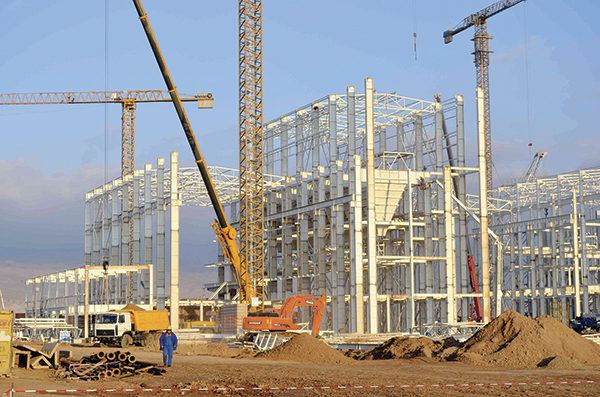Although thousands of kilometres separate Belarus from Turkmenistan, these two sovereign states have long been efficiently liaising in the economic sphere.

At the construction of the Garlyk mining complex
They mutually supplement each other, as has become evident in recent years. Thanks to much work, mutual turnover (in goods and services) has significantly increased since 2006, from $15mln, to $450mln in 2013.
The presidents of Belarus and Turkmenistan — Alexander Lukashenko and Gurbanguly Berdimu-hamedov — initially set a task of steadily developing economic partnerships, meeting regularly in Ash-gabat and Minsk.
Diverse agreements have been signed, in addition to other documents ensuring a favourable climate for collaboration. As Mr. Berdimuhamedov noted during his recent visit to Minsk, 16 major investment projects (worth over $1.145bln) are being realised in Turkmenistan, jointly with Minsk. Heads of the two states’ governments exchange visits regularly, as do heads of ministries, including economic, agencies and companies.
The project by Belarusian specialists to build the ‘ready-to-operate’ Garlyk mining complex is a symbol of friendship and co-operation. Belarus boasts much expertise, thanks to its huge deposits of potassi-um salts, which are vital for efficient crop growing, and has its own industry to produce corresponding mineral fertilisers. Belarus has powerful mining and potassium ore processing factories, in addition to the Shakhtospetsstroy Construction-Assembly Trust and Design Institute.
This potential is being used for a joint project estimated to cost $1bln and producing up to 1.4mln tonnes of concentrated potash fertilisers in Turkmenistan, to be ready in coming years, enabling the country to fully satisfy its needs and enhance agriculture. In fact, only half the volume will be required domestically, allowing the remaining 700,000 tonnes a year to be profitably exported. Belarus — as a major world player at this market — is ready to propose its commodity distribution network to sell this profitable product. Scientists from our two states are looking to the future, proposing a complex near-by to produce the most popular combined NPK-fertilisers.

Tractors of Minsk Tractor Works
Supplies of machine building produce are also developing efficiently. At present, over 5,000 Belarusian MTW wheeled tractors work in Turkmen fields, while MAZ trucks are transporting cargoes. In recent years, over 10,000 of the latter have been sold to Turkmenistan, thanks to an agreement to supply Belarusian agricultural machinery, cars, tractors and passenger machinery (for 2015-2016, signed during Mr. Berdimuhamedov’s visit to Minsk in October 2014). Shipment of Minsk Automobile Works’ buses to Turkmenistan has begun and, following on site pilot testing, greater volumes are likely to be agreed.
Minsk Automobile Plant is a core of co-operation in the machine-building sphere. Within the next few weeks, a MAZ service centre is to open in Turkmenistan, able to maintain various models of Belarusian machinery: not only MTW tractors but Amkodor road and construction machinery, Gomselmash com-bine harvesters and other agricultural machinery and vehicles by other manufacturers.
Sales of Belarusian lifts are also growing, with over 40 already installed at new residential houses in Turkmenistan. Belarusian lifts are enjoying recognition in the CIS, thanks to their comfort, safety and affordability. They are likely to be in demand in Turkmenistan, where housing construction is growing.

Co-operation in the field of light industry also looks promising, as has many times been mentioned by the Head of the Belarusian Parliament’s Upper Chamber, Mikhail Myasnikovich. Turkmenistan is a ma-jor producer of cotton fibre, which is sought after by various large companies in Belarus, for processing into threads, fabrics and ready made products: an industrial legacy from the Soviet times. Baranovichi Cotton Production Amalgamation is the largest in Europe and, now, Belarus and Turkmenistan are con-sidering a joint venture, with Turkmenistan supplying raw materials, making it mutually profitable.
A modern economy is impossible without highly qualified specialists and, with this in mind, Belarus and Turkmenistan are closely co-operating. Agreements have been concluded between major Belarusian and Turkmen universities — such as the Belarusian National Technical University and the Architectural-Construction Institute, the Belarusian Technological University and the International University of Oil and Gas. Over 9,000 Turkmens are currently studying in Belarus, accounting for around half of all for-eign students in our country. As time passes, they will become specialists in their spheres: engineers, doctors and scientists. Such development of human skill is sure to create new impetus for Turkmeni-stan’s future.
By Vladimir Bibikov











